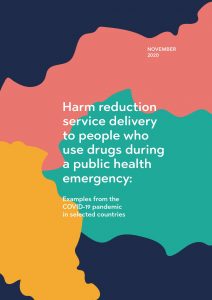Harm reduction service delivery to people who use drugs during a public health emergency: Examples from the COVID-19 pandemic in selected countries
Virtually every country of the world has been faced with the COVID-19 pandemic. As learning developed as to how to combat transmission of the virus, countries increasingly resorted to national ‘lockdowns’ during the first wave of the pandemic from around March to June 2020. After coming out of the first wave of COVID-19, countries have used local, regional and national ‘lockdowns’ to once again prevent further transmission during the second wave and similar approaches are expected in the future in the event of further waves of the pandemic hitting countries until every country can vaccinate a high proportion of their population. For those people who are highly drug dependent, with a resulting compromised immune system, COVID-19 presents a serious threat to life regardless of age. Governments, non-governmental (NGOs) and communitybased organisations (CBOs) working to support people who use drugs, and other vulnerable and marginalised people in society, have had to react rapidly to the massive increase in COVID-19 transmission across countries and continents. The ten case studies presented here provide a snapshot of the responses of specific organisations and communities who work with people who use drugs and some other marginalised groups around the world, including Afghanistan, Australia, the Czech Republic, Kenya, Poland, Russia, Spain, Switzerland, Ukraine and the United Kingdom.


4 thoughts on “Harm reduction service delivery to people who use drugs during a public health emergency”
Comments are closed.